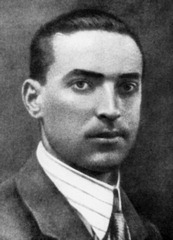 Vygotsky
Vygotsky 
 Vygotsky, Lev
Vygotsky, Lev 
 Influences on
Influences on 
 Working in Socientic Union
Working in Socientic Union 
USSR (1917-1964). Following the revolutions of 1917, the USSR was, for a short time, a strong influence on the thinking and imagination of many contemporary Western intellectuals. However, following the death of Lenin, and with Stalin leading the country, psychologists working in the USSR became increasingly insulated from US and European intellectual influences. This led to the development of a unique approach to psychology, best represented by Vygotsky and Luria, that was broadly Marxist in intent, and stressed the interaction between people and culture. In recent years, these psychologists have enjoyed increasingly popularity beyond the USSR. Written by: Course Team

 It was in this laboratory that he first performed his own experiments on dominant reactions and respiration. His shift in interest into the problems of psychology, education and paedology was a gradual one, but recognition of his work prompted an invitation to join Kornilov's Institute of Experimental Psychology in Moscow.
It was in this laboratory that he first performed his own experiments on dominant reactions and respiration. His shift in interest into the problems of psychology, education and paedology was a gradual one, but recognition of his work prompted an invitation to join Kornilov's Institute of Experimental Psychology in Moscow. 
 In his cultural-historical theory he wrote of the cultural and social construction of the human mind . As Van der Veer and Valsiner explain: he attempted to sketch how cultural man attempts to overcome the 'stikhia', the elemental chaos of nature, through the creation of cultural instruments.
In his cultural-historical theory he wrote of the cultural and social construction of the human mind . As Van der Veer and Valsiner explain: he attempted to sketch how cultural man attempts to overcome the 'stikhia', the elemental chaos of nature, through the creation of cultural instruments. 
 Written by: Course Team Source: van der Veer, R. and Valsiner, J. (1991) Understanding Vygotsky: a q uest for synthesis, Oxford, Blackwell.
Written by: Course Team Source: van der Veer, R. and Valsiner, J. (1991) Understanding Vygotsky: a q uest for synthesis, Oxford, Blackwell. 
 Lev Vygotsky Lev Vygotsky (1896- 1934), one of the significant post-revolutionary Soviet psychologists, was born in 1896 in Orsha, a town near Minsk. Between 1913 and 1917 he studied law, history and philosophy at Moscow University and the Shanjavsky People's University. He completed his university studies in 1917.
Lev Vygotsky Lev Vygotsky (1896- 1934), one of the significant post-revolutionary Soviet psychologists, was born in 1896 in Orsha, a town near Minsk. Between 1913 and 1917 he studied law, history and philosophy at Moscow University and the Shanjavsky People's University. He completed his university studies in 1917. 
 Here he conducted research, lectured, and published until he died of tuberculosis in 1934. Vygotsky' s work was inspired by literary scholarship, psychoanalysis, Gestalt Psychology and paedology.
Here he conducted research, lectured, and published until he died of tuberculosis in 1934. Vygotsky' s work was inspired by literary scholarship, psychoanalysis, Gestalt Psychology and paedology. 
 From 1918-1924 he taught literature and psychology at various institutes, including the Soviet Labou r School and the Gomel Teacher College. It was in the Gomel Teacher College that Vygotsky established a small psychological laboratory where his students conducted simple practical investigations.
From 1918-1924 he taught literature and psychology at various institutes, including the Soviet Labou r School and the Gomel Teacher College. It was in the Gomel Teacher College that Vygotsky established a small psychological laboratory where his students conducted simple practical investigations. 
 Deeply appreciating the finest artefacts of culture Vygotsky persisted in believing that the 'stikhi a' would be overcome by culture and that a new human society would be its result.' (page 17)
Deeply appreciating the finest artefacts of culture Vygotsky persisted in believing that the 'stikhi a' would be overcome by culture and that a new human society would be its result.' (page 17) 
Top


